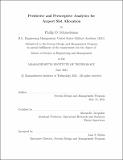Predictive and Prescriptive Analytics for Airport Slot Allocation
Author(s)
Schmedeman, Phillip D.
DownloadThesis PDF (2.442Mb)
Advisor
Jacquillat, Alexandre
Terms of use
Metadata
Show full item recordAbstract
Slot allocation is the primary form of strategic demand management practiced at airports globally to address congestion and reduce delay. To perform slot allocation, airport schedulers must account for detailed requests from hundreds of airlines for thousands of flights over a six-month season while adhering to variable airport capacities and the Worldwide Airport Slot Guidelines (WASG). This represents a highly complex combinatorial scheduling problem that has vast implications for airlines and passengers. While previous research has proposed a range of optimization models to support slot allocation, they commonly assume a flight-centric approach, which may extend or eliminate passenger connections without accounting for the costs.
This thesis develops an original approach to airport slot allocation that incorporates passenger considerations. The proposed multi-objective optimization model allocates slots according to the WASG and airport capacity constraints while minimizing one flight-centric metric---schedule displacement---and two passenger-centric metrics---infeasible connections and connection time. Since this approach requires passenger forecasts to account for costs, we use historical itinerary data and machine learning methods to predict passenger flows across a network of flights. We apply this predict-then-optimize framework using real-world data from Singapore Changi Airport to create slot assignments that achieve Pareto optimality in acceptable computation times. The results indicate that schedule-coordinated airports can reduce passenger costs from slot allocation, with relatively small adjustments to schedule displacement. Ultimately, the proposed multi-objective formulation provides a new paradigm that can create more attractive flight schedules at major airports worldwide, based on airport-level considerations, airline-level considerations, and, for the first time, passenger-level considerations.
Date issued
2021-06Department
System Design and Management Program.Publisher
Massachusetts Institute of Technology